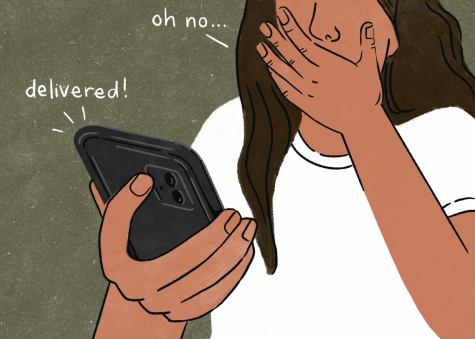Awkward: Your friend found out you were talking behind their back. Now what?
December 10, 2020

Your friend was not supposed to receive the text that described them as “annoying.” That was supposed to go to your other friend. The two of you had been talking behind Person A’s back and a technological slip-up exposed your gossiping ways. Now, your friend knows you think they are annoying. Will anything smooth that over?
Experts offer a friendship repair plan:
“When it happens, that calls for honesty,” said Kendra Knight, an assistant professor of communication studies at DePaul University.
But not so much honesty as to cause more damage than what has already been done, she said.
Imagine yourself in the other person’s shoes, Knight said. They just received a text that revealed that their friend was talking behind their back—and one that paints them in a negative light. Apologize swiftly, Knight said, and take the middle ground; admit fault, but do not belabor the point.
In your apology, let the person know you intended the message for someone else, Knight said. Tell the person you are embarrassed and sorry that the message was sent to them by mistake.
“Everyone knows that everybody does this,” she said. “But you can’t say that.”
Knight said your friend will likely be hurt by your actions. She said this often has to do with concern about their social status within the friend group. Once they know they have been talked about, they may feel unable to trust those who talked about them. They may also feel like the threads of your friendship are starting to unravel, or they are suddenly an outsider.
“Messaging or communication you can use to reassure them of their status would be mollifying [and] would help soothe that wound,” Knight said.
Bonnie Tsai, founder and director of the etiquette training company Beyond Etiquette, said the important thing is that you own up to it right away. Denying wrongdoing only creates further miscommunication, Tsai said.
Instead, see your mistake as an opportunity to discuss the conflict with the person. If you truly feel your friend is annoying, this might be a good time to discuss why you feel that way.
“See it as an opportunity to learn and an opportunity to deepen your relationship as well,” Tsai said. “It does take a lot of courage to be vulnerable.”
Even so, it is best to avoid something like this happening again, said Irene S. Levine, a psychologist and friendship expert. She recommends you do not create a physical record of something you do not want others finding out.
“You always need to be careful about what you put in writing … because that doesn’t necessarily mean it’s going to be private,” said Levine, who also operates the advice blog, The Friendship Blog. “The individual can send it to somebody else.”
The roles can also be reversed. If you are the recipient of a message you were never meant to see, you can be the first to say something about it, Levine said. Approach this conversation with an open mind to have an honest discussion about what was said about you.
“The person might have been reasonable in what they were saying, even though it might have been something that was better said to your face rather than to your back,” she said.







